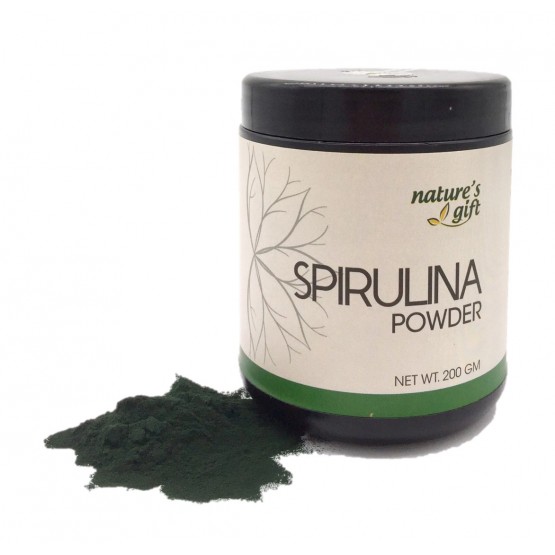SPIRULINA POWDER - Size : 200gm
Nature’s Living Energy
Nature’s Gift Spirulina is Blue Green Algae that live in Bacteria Free Alkaline Waters. Research shows Spirulina to be one of the richest food in the world.
Spirulina provides a balanced array of nutrients you need. It offers astonishing health benefits! It has a soft cell wall, so its nutrients are easy-to-digest and easy-to-absorb by the body.
Spirulina is rich in chlorophyll than alfalfa or wheat grass, is loaded with many other organic minerals that are essential to health.
- Contains 65% protein which is 95% digestible: compare with chicken, which is 24% protein and only 20% digestible. Rich in health beneficial phyto-pigments such as chlorophyll, carotenoid-based pigments and phycocyanin, which are also strong antioxidants
- 25 times more carotene than carrots; 50 times more carotene than spinach
- 3 times more Vitamin E than wheat germ
- Highest whole food source of Vitamin B12 and B Complex; one heaped dessertspoon (approximately 12g) of Spirulina powder provides over 500% of the US RDA of vitamin B12, 21% of vitamin B2, 21% of vitamin B1 and 7% of niacin
- 2-6 times higher in iron than beef liver; 300% more iron than steak
- Loaded with organic minerals like calcium, magnesium, potassium, chromium and other trace minerals; contains more than 9 important vitamins and over 14 minerals which are highly bioavailable
- Contains more potassium than rice
- More antioxidants than any whole food Richer in chlorophyll than alfalfa or wheat grass Rich in Glycogin (rarely found in plants) 3 times more Gamma Linolenic Acid (GLA) than Evening Primrose Oil (EPO)
- Good source of natural enzymes
Ingredients
100% pure Spirulina. No added sugar, fillers, preservatives or colour
Scientific trials revealed amazing health benefits
Constituents such as polysaccharides (rhamnose and glycogen) and essential fat (gamma linolenic acid) boost energy levels. These constituents are easily absorbed by human cells and help in energy release1. ·
Spirulina has been well-documented for its anti-inflammatory properties by inhibiting the allergy-triggering histamine2.
Studies demonstrated that supplementation of spirulina by ischemic heart disease patients were accompanied by significant reduction of blood cholesterol, triglycerides and LDL cholesterol3. ·
The antioxidant and immune modulation effects of spirulina may help to destroy tumour, thereby has a role in preventing cancer4.
How to take
- Time of ill health
An hourly spirulina drink of 1 teaspoon of spirulina in a glass of water, sweetened with raw honey, if desired. It is also suitable for children.
- For athlete
Take 1 teaspoon of powder, or 10 tablets with water, half an hour before performance.
- For slimming
Take 1 teaspoon of powder or 10 tablets, half an hour before meal.
- For health maintenance
Take 1 teaspoon of powder or 10 tablets, once or twice daily.
Who will benefit from Spirulina?
- People with poor digestion and assimilation (spirulina is easy to digest and absorb)
- People with poor vitality and anemia
- People who take prescription drugs (spirulina protects the kidneys and liver)
- People who eat refined or processed foods
- Children, women, pregnant and nursing mothers and the elderly
- People who are overweight or obese
- People with low energy level
- People who engage in physical exercise/ strength training
- Vegetarians, as it contains a wholesome source of essential nutrients like protein and B12 which are normally found in meat
References
- Karkos, P.D., Leong, S.C., Karkos, C.D., Sivaji, N. and Assimakopoulos, D.A. 2008. Spirulina in clinical practice: evidence-based human application. Evidence-based Complementary and Alternative Medicine 2011: 1-4.
- Yang, H-N., Lee, E-H. and Kim, H-M. 1997. Spirulina platensis inhibits anaphylactic reaction. Life Sciences 61: 1237-1244.
- Ramamoorthy, A. and Premakumari, S. 1996. Effect of supplementation of spirulina on hypercholesterolemic patients. Journal of Food Science and Technology 33: 124-128.
- Adam, M. 2009. Superfoods for optimum health: chlorella and spirulina. Retrieved 20 November 2011 from http://www.TruthPublishing.com.
Disclaimer: The contents on this page are not to be substituted for medical advice or diagnosis. The information presented here is purely for educational purpose. This is not a prescription for self-diagnosis or self-medication. Consult your own physician regarding the application of any opinions and recommendations with respect to your symptoms or medical conditions

